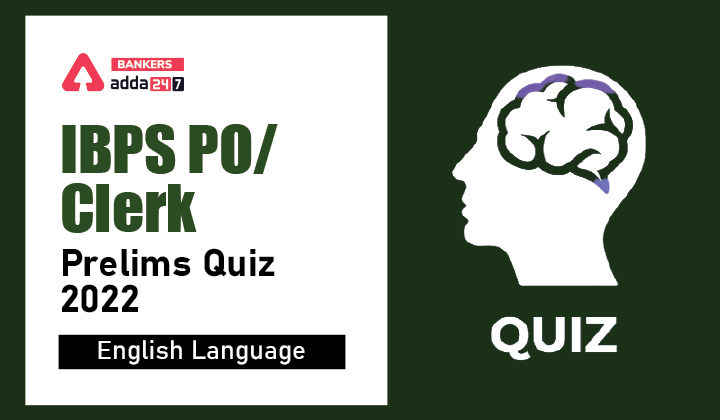Direction (1-5): Read each sentence to find out whether there is any grammatical error or idiomatic error in it. The error, if any, will be in one part of the sentence. The number of that part is the answer. If there is no error, the answer is (5). (Ignore errors of punctuation, if any.)
Q1. Your over-independent on a)/ others even for b)/ trivial matters may c)/ prove disadvantageous. d)/ No error e)
(a) a
(b) b
(c) c
(d) d
(e) e
Q2. People who are a)/ fortunate enough to own b)/ a personal library are always c)/ held in high esteem by me. d)/ No error e)
(a) a
(b) b
(c) c
(d) d
(e) e
Q3. A small loaf of bread a)/ given with affection b)/ is far superior to c)/ a delicious dish served with indifferently. d)/ No error e)
(a) a
(b) b
(c) c
(d) d
(e) e
Q4. Everybody know a)/ that his failure can b) be attributed only c)/ to his lack of practice d.) No error e)
(a) a
(b) b
(c) c
(d) d
(e) e
Q5. Most of the popular tele-serials a)/ are not only illogical b)/ in their story line c)/ but also crude in their presentation. d)/ No error e)
(a) a
(b) b
(c) c
(d) d
(e) e
Directions (6-10): Rearrange the following six sentences (A), (B), (C), (D), (E), and (F) in the proper sequence to form a meaningful paragraph and then answer the questions given below.
(A) Just like history has witnessed many forms of government.
(B) Government may take several forms.
(C) If these normal forms are perverted, monarchy becomes tyranny, aristocracy becomes oligarchy and polity becomes democracy.
(D) Aristotle had given a six-fold classification of governments-three normal and three perverted forms of government.
(E) Thus, Aristotle regarded democracy as the worst form of government, but he felt that the potential capacity of the citizens for sound collective judgements could assure the success of this form.
(F) The three normal types of government are monarchy, rule by one person; aristocracy, rule by a few; polity, rule by the many.
Q6. Which of the following should be the THIRD sentence after rearrangement?
(a) B
(b) A
(c) C
(d) E
(e) D
Q7. Which of the following should be the LAST (SIXTH) sentence after rearrangement?
(a) F
(b) E
(c) B
(d) D
(e) C
Q8. Which of the following should be the FIRST sentence after rearrangement?
(a) B
(b) C
(c) D
(d) E
(e) F
Q9. Which of the following should be the FOURTH sentence after rearrangement?
(a) A
(b) B
(c) F
(d) C
(e) D
Q10. Which of the following should be the SECOND sentence after rearrangement?
(a) D
(b) F
(c) B
(d) A
(e) E
Direction (11-15): In the following passage there are blanks, each of which has been numbered. These numbers are printed below the passage and against each five words have been suggested, one of which fills the blanks appropriately. Find out the appropriate word in each case.
Traditional bank architecture is based on bank branches. These branches ensure the physical (11) of a customer’s savings. A customer may go there to deposit and withdraw money, negotiate loans and (12) in other financial transactions. In the past two decades banking architecture has changed-the Automated Teller Machine (ATM) has been a big luxury and credit and debit cards have created new financial spaces. (13) the bank branch has remained the bedrock of the banking system-after all a person needs a bank account in a branch before he can operate a debit or ATM card. This may be about to change as technocrats now view cell phones as the new architecture of virtual banks. This has the potential to make branches (14). Cell phone banking looks especially relevant for India since it can penetrate the countryside cheaply and effectively. The world over cell phones is spreading at a phenomenal rate and in India alone new cell phone connections are growing at the rate of six million a month a rate of customer (15) that no bank can dream of.
Q11.
(a) confidentiality (b) guarantee (c) knowledge (d) security (e) presence
Q12.
(a) enable (b) engage (c) pursue (d) imitate (e) regulate
Q13.
(a) Yet (b) Until (c) Despite (d) Although (e) Even
Q14.
(a) retreat (b) expired (c) essential (d) obsolete (e) extant
Q15.
(a) satisfaction (b) relationship (c) discount (d) base (e) expansion
Solutions
S1. Ans. (a)
Sol. ‘Your over-dependence on’ is the correct usage. As ‘dependent’ is an adjective, its noun form will be used as a subject.
S2. Ans. (e)
Sol. No error
S3. Ans. (d)
Sol. The word ‘indifferently’ has wrongly been used. It should be replaced with its noun form ‘indifference’.
S4. Ans. (a)
Sol. ‘Everybody’ is a singular noun. Hence, the correct verb should be ‘knows’, not ‘know’
S5. Ans. (e)
Sol. No error
S6. Ans. (e)
Sol. The proper sequence of sentences to form a meaningful paragraph will be BADFCE
S7. Ans. (b)
Sol. The proper sequence of sentences to form a meaningful paragraph will be BADFCE
S8. Ans. (a)
Sol. The proper sequence of sentences to form a meaningful paragraph will be BADFCE
S9. Ans. (c)
Sol. The proper sequence of sentences to form a meaningful paragraph will be BADFCE
S10. Ans. (d)
Sol. The proper sequence of sentences to form a meaningful paragraph will be BADFCE
S11. (d)
S12. (b)
S13. (a)
S14. (d)
S15. (e)



 GA Capsule for SBI Clerk Mains 2025, Dow...
GA Capsule for SBI Clerk Mains 2025, Dow...
 The Hindu Review October 2022: Download ...
The Hindu Review October 2022: Download ...
 Bank Exams 2025, Check Full List of Upco...
Bank Exams 2025, Check Full List of Upco...


